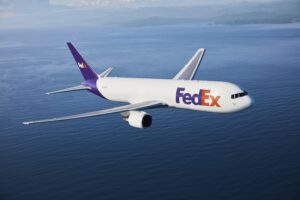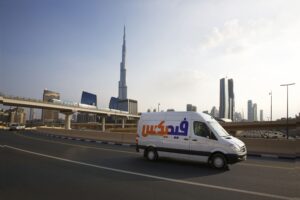FedEx Drives Economic Impact Across The Middle East Through Large-Scale Investments
FedEx Corp. (NYSE: FDX) released its annual economic impact report, analyzing the company’s worldwide network and role in building prosperity in local communities during its 2024 fiscal year (FY 2024). Produced in consultation with Dun & Bradstreet (NYSE: DNB), a leading provider of business decisioning data and analytics, the study underscores the ‘FedEx Effect’—the impact FedEx has on accelerating the flow of goods and ideas that generate economic growth globally, including significant investments in the Middle East.
“At FedEx, we have a vision to make supply chains smarter for everyone by leveraging advanced data and technology to better serve our customers and their customers, thereby extending our reach and impact,” said Raj Subramaniam, president and CEO, FedEx Corporation. “The ‘FedEx Effect’ represents our relentless commitment to excellence, economic growth, and the communities where we live and work.”
The report reveals that FedEx contributed more than US$85 billion in direct impact to the global economy in FY 2024, accounting for approximately 0.1% of the world’s total net economic output. In the Middle East, Indian Subcontinent and Africa (MEISA), FedEx directly contributed 0.1% to the net economic output of the region’s Transportation, Storage, and Communications sector in 2024. In addition, FedEx indirectly contributed an estimated US$280 million to the region’s overall economy in FY 2024.
“At FedEx, we are committed to supporting the impressive growth and transformation happening across the Middle East,” said Kami Viswanathan, regional president, FedEx MEISA. “Our infrastructure and services in this region are designed to empower local businesses and connect them to global opportunities. By investing in seamless, multimodal logistics solutions and state-of-the-art facilities, we aim to enhance cross-border trade while contributing to overall economic and environmental progress across the region.”
A key highlight is the launch of the state-of-the-art FedEx hub at Dubai World Central (DWC) Airport in Dubai South, which marks the company’s long-term investment of more than US$350 million into the UAE economy through infrastructure and technological advancements in the facility. The 57,000-square-meter hub features automated sort systems that process packages more efficiently and accurately, sustainable technologies such as energy-efficient systems and electric charging stations for FedEx and employee vehicles, and a 170-square-meter cold storage area to accommodate temperature-sensitive shipments. These features position the hub to boost the aviation and logistics sectors while solidifying Dubai’s role as a critical center for regional and international trade.
The company has also continued to expand its regional network with the signing of a Memorandum of Understanding to establish a regional logistics facility in Qatar’s free zones, and the enhancement of intercontinental services between Vietnam and the Middle East through a new flight service that offers faster transit time for importers in the UAE and Saudi Arabia.
In addition, FedEx introduced new solutions to help SMEs and businesses in the Middle East elevate their shipping strategies and expand global trade opportunities. This includes the FedEx Less-than-Container Load Priority multimodal service, which utilizes an integrated ocean and road network to provide faster and cost-effective shipping from Asia Pacific to key Middle East markets. Meanwhile, through FedEx® Regional Economy and FedEx® Regional Economy Freight services, the company also offers deferred, cost-effective, day-definite road services for less urgent shipments within the UAE, Saudi Arabia, Bahrain, Kuwait, Oman, and Jordan.
FedEx also contributed to the region’s sustainability initiatives by adding electric vehicles to its UAE fleet in FY 2024 and introducing FedEx® Sustainability Insights, a tool which allows customers to estimate the carbon footprint of their shipments within the FedEx network, supporting their own emissions reporting. FedEx team members also drove positive social impact by giving back to their communities through projects in 13 cities across MEISA. For example, in Ramadan, 100 FedEx team members in the UAE and Egypt packed more than 2,300 food hampers for those in need.
Find out more about the FedEx Effect on communities and economies across the Middle East in the FY 2024 FedEx Global Economic Impact Report at fedex.com/economicimpact.









 Email: info@cyber-gear.com
Email: info@cyber-gear.com